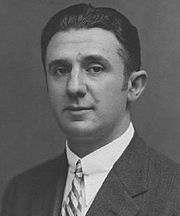Enrique Moles Ormella facts for kids
Quick facts for kids
Enrique Moles Ormella
|
|
|---|---|
 |
|
| Born | 26 August 1883 Vila de Gràcia, Barcelona
|
| Died | 30 March 1953 (aged 69) |
| Nationality | Spanish |
| Alma mater | Complutense University of Madrid University of Geneva |
| Known for | Determination of atomic weights |
| Awards | Grand Officer Order of the Spanish Republic (1933) Legion of Honour (1936) Lavoisier Medal (1937) |
| Scientific career | |
| Fields | Physical chemistry |
| Signature | |
Enrique Moles Ormella (born August 26, 1883 – died March 30, 1953) was a very important Spanish scientist. He worked as a pharmacist, a physicist, and a chemist. He is most famous for his work on finding the exact atomic weights of different elements. Many people consider Enrique Moles to be one of the best Spanish chemists of his time.
Contents
About Enrique Moles
His Early Life
Enrique Moles was born on August 26, 1883, in Vila de Gràcia, a town near Barcelona, Spain. Sadly, his parents, Pedro Moles Alrich and Maria Ormella Figuerola, passed away when he was a baby.
His Education
Enrique Moles earned his first degree from Colegio Iberico in Barcelona. In 1900, he started studying pharmacy at the Complutense University of Madrid. He became a Doctor of Pharmacy in 1906.
Moles loved learning and continued his studies. In 1909, he went to the University of Munich and then to the University of Leipzig in 1910. There, he worked with Dr. K. Drucker to figure out atomic weights.
In 1916, he studied with Professor Philippe A. Guye at the University of Geneva. He focused on finding the atomic weight of bromine and earned a Doctor of Physics degree that same year. By 1920, after all his studies, Moles earned a third doctoral degree, this time in chemistry. His chemistry thesis was about the atomic weight of fluorine.
His Career and Important Roles
Enrique Moles represented Spain at a big science meeting called the 2nd General Conference of IUPAC in 1921. IUPAC stands for the International Union of Pure and Applied Chemistry. It's an organization that sets standards for chemistry around the world.
Later, he became the vice-president of IUPAC from 1934 to 1938. In 1949, Moles joined the International Atomic Weight Commission. He was chosen as the very first Secretary of this important group. He served as the Secretary until he passed away in 1953.
Challenges During the Civil War
The Spanish Civil War (1936-1939) was a very difficult time for Enrique Moles. In 1936, he was a professor and a leader at the Complutense University of Madrid. He also led a department at the National Institute of Physics and Chemistry.
When the war started, Moles took charge of the National Institute of Physics and Chemistry. In 1937, he was put in charge of making explosives for the government.
In 1939, Moles went to France. When he returned to Spain in 1941, he faced problems because of his actions during the war. He was removed from his university job in 1944. After that, he worked as a technical advisor at a different institute called IBYS.
His Honors
In 1992, the Institute for Organometallic Chemistry at the University of Oviedo was named after Enrique Moles. This was done to honor his important contributions to science.
See also
 In Spanish: Enrique Moles para niños
In Spanish: Enrique Moles para niños

